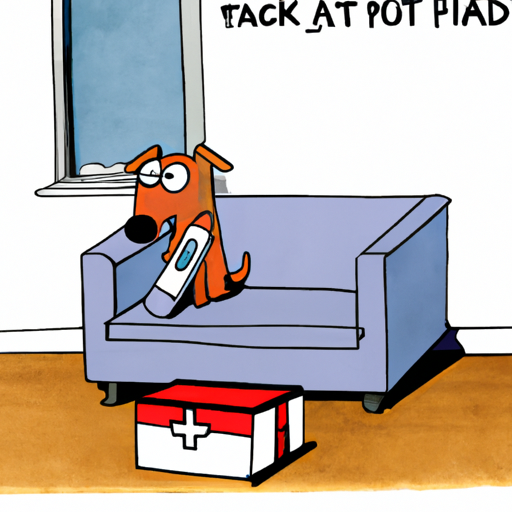Caring for your canine companion involves more than just providing food, water, and regular walks. Dogs, like humans, can get sick, and they often exhibit certain behaviors that indicate they’re not feeling well. Among these behaviors is the tendency to hide. This piece will delve into the reasons why dogs hide when they are sick, what signs to look out for, and how to care for a sick dog.
Why Do Dogs Hide When They Are Sick?
Dogs’ behaviors are deeply rooted in their wild ancestors’ instincts. When a wolf in the wild gets sick, it often hides to avoid appearing weak to predators or rivals. Your dog, despite its domestication, still retains this instinct.
Hiding provides a sense of safety for your dog. It’s a place they can rest and recover without disturbance. This behavior is their way of communicating to you that they need some time alone to deal with what they’re experiencing.
Signs That Your Dog Might Be Sick
While hiding is one sign that your dog might be sick, it’s not the only one. Here are some other symptoms to look out for:
- Changes in eating habits: If your dog is eating less than usual or showing no interest in food, it could be a sign that they’re not feeling well.
- Lethargy: A sick dog often spends more time sleeping or resting than usual. They might also show less interest in physical activities they usually enjoy.
- Behavioral changes: Apart from hiding, a sick dog might become more aggressive or anxious. They might also start to exhibit behaviors they had previously grown out of, like destructive chewing.
- Physical changes: Look out for changes in your dog’s physical appearance, such as weight loss, dull coat, or red, watery eyes.
| Signs | Possible Reasons |
|---|---|
| Changes in eating habits | Dental issues, gastrointestinal problems |
| Lethargy | Any illness can cause fatigue |
| Behavioral changes | Pain, anxiety |
| Physical changes | Various illnesses |
How to Care for a Sick Dog
If you suspect that your dog is sick, the first thing you should do is contact your vet. They can give you advice based on your dog’s symptoms and help you decide whether an immediate visit is necessary.
Here are some general tips on caring for a sick dog:
- Provide a quiet, comfortable space for your dog to rest.
- Ensure they have access to fresh water at all times.
- Try to encourage them to eat, but don’t force it.
- Keep an eye on their symptoms and report any changes to your vet.
Precautions to Prevent Illness in Dogs
Prevention is always better than cure. Here are some steps you can take to help keep your dog healthy:
- Regular vet check-ups: Routine veterinary care is essential for catching potential health issues early.
- Vaccinations: Keep your dog up-to-date with all necessary vaccinations.
- Healthy diet: A balanced, nutritious diet can keep your dog’s immune system strong.
- Regular exercise: Physical activity can help keep your dog fit and reduce the risk of certain health problems.
Frequently Asked Questions
Q: My dog is hiding, but doesn’t seem to have any other symptoms. What should I do?
A: It’s possible that your dog is just seeking a quiet place to relax. However, if the behavior continues, it’s best to consult your vet to rule out any potential health issues.
Q: Can stress make my dog sick?
A: Yes, just like humans, dogs can become ill due to stress. Stress can weaken your dog’s immune system, making them more susceptible to disease.
Q: How can I make my dog more comfortable when they’re sick?
A: Try to provide a quiet, comfortable space for your dog to rest. Keep them hydrated and monitor their symptoms closely. If your dog seems to be in pain, contact your vet for advice.
In conclusion, if your dog starts hiding or showing any other signs of illness, it’s important to take action quickly. Remember, you know your dog better than anyone else, so trust your instincts. Your swift response can make a big difference in your dog’s recovery.



